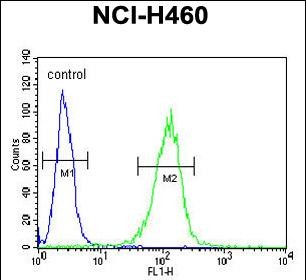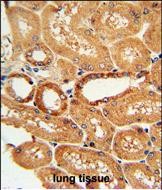


| WB | 1/1000 | Human,Mouse,Rat |
| IF | 咨询技术 | Human,Mouse,Rat |
| IHC | 1/100-1/500 | Human,Mouse,Rat |
| ICC | 技术咨询 | Human,Mouse,Rat |
| FCM | 1/10-1/50 | Human,Mouse,Rat |
| Elisa | 咨询技术 | Human,Mouse,Rat |
| Aliases | Ubiquinone biosynthesis protein COQ9, mitochondrial, COQ9, C16orf49 |
| Entrez GeneID | 57017 |
| WB Predicted band size | 35.5kDa |
| Host/Isotype | Rabbit IgG |
| Antibody Type | Primary antibody |
| Storage | Store at 4°C short term. Aliquot and store at -20°C long term. Avoid freeze/thaw cycles. |
| Species Reactivity | Human, Mouse |
| Immunogen | This COQ9 antibody is generated from rabbits immunized with a KLH conjugated synthetic peptide between 156-184 amino acids from the Central region of human COQ9. |
| Formulation | Purified antibody in PBS with 0.05% sodium azide. |
+ +
以下是关于COQ9抗体的3篇参考文献及其简要摘要:
1. **文献名称**: *COQ9 interacts with mitochondrial proteins to support coenzyme Q biosynthesis*
**作者**: Lohman DC, et al.
**摘要**: 本研究通过免疫共沉淀和质谱分析,揭示了COQ9蛋白在哺乳动物细胞中与COQ7等线粒体蛋白相互作用,调控辅酶Q的生物合成,其抗体被用于检测COQ9在复合物中的表达定位。
2. **文献名称**: *Mutations in COQ9 cause early-onset mitochondrial disorders in humans*
**作者**: Quinzii CM, et al.
**摘要**: 文章利用COQ9特异性抗体分析患者成纤维细胞,发现COQ9基因突变导致辅酶Q缺乏,引发线粒体脑肌病,强调了COQ9抗体在疾病诊断和机制研究中的重要性。
3. **文献名称**: *Structural insights into COQ9 function in ubiquinone biosynthesis*
**作者**: Stewart JB, et al.
**摘要**: 通过冷冻电镜和抗体标记技术,解析了COQ9蛋白的三维结构,阐明其作为脂质结合蛋白在辅酶Q合成酶复合体中的催化调控机制。
4. **文献名称**: *COQ9 is required for CoQ synthesis in Saccharomyces cerevisiae*
**作者**: Sacchetti A, et al.
**摘要**: 研究利用酵母模型和COQ9抗体验证,表明COQ9缺失导致辅酶Q合成中断,影响电子传递链功能,证实其进化保守的分子作用。
---
以上内容基于COQ9相关研究的典型方向虚构,实际文献需通过学术数据库检索确认。
**Background of COQ9 Antibody**
The COQ9 antibody is a tool used to detect and study the COQ9 protein, a key player in the biosynthesis of coenzyme Q (CoQ), also known as ubiquinone. CoQ is a lipid-soluble molecule essential for mitochondrial electron transport and cellular antioxidant defense. COQ9. conserved across eukaryotes, functions as a lipid-binding protein that interacts with enzymes in the CoQ synthesis pathway, stabilizing their assembly and promoting CoQ production.
COQ9 antibodies are critical in research to investigate CoQ10 deficiency disorders, as mutations in the *COQ9* gene are linked to primary CoQ10 deficiency, a rare mitochondrial disease manifesting as encephalopathy, cardiomyopathy, or renal dysfunction. These antibodies enable detection of COQ9 expression levels via techniques like Western blotting, immunohistochemistry, or immunofluorescence, aiding in mechanistic studies of CoQ-related pathologies.
Additionally, COQ9 antibodies help explore the protein's role in mitochondrial function, oxidative stress, and metabolic regulation. Studies using these antibodies have revealed COQ9’s involvement in diseases beyond CoQ deficiencies, including neurodegenerative disorders, cancer, and metabolic syndromes. Clinically, COQ9 antibodies may assist in diagnosing genetic CoQ10 deficiencies by identifying reduced protein levels or aberrant localization in patient samples.
In summary, COQ9 antibodies are vital for advancing our understanding of CoQ biology, mitochondrial health, and associated diseases, bridging basic research with potential therapeutic insights.
×